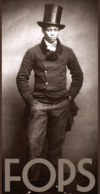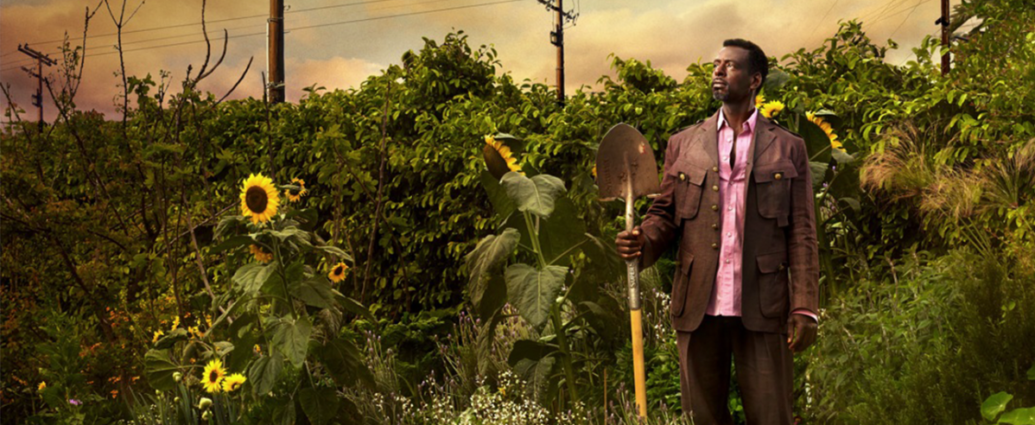Gardening is an act of defiance for Ron Finley, the “Gangsta Gardener”

Ron Finley’s career as a self-proclaimed “gangsta gardener” started with what he calls a single act of defiance.
Finley planted an edible garden in the “parkway” — what the City of Los Angeles calls the median between the sidewalk and the street — in front of his house. After scraping away the scrubby grass along the 10-foot-wide, 150-foot-long strip, he planted everything from strawberries and kale to fig and banana trees.
When his garden started to flourish and grew tall, the city paid him a visit. His food garden was out of compliance. He received a citation and an order to remove the garden. He fought to keep it, and six years later the Ron Finley Project is an internationally known movement.
As a bad boy of guerrilla gardening — gardening on land that the gardeners do not have the legal right to cultivate, such as abandoned sites, areas that are not being cared for or private property— Finley is now a spokesman for a movement. He travels to cities and countries around the world to drop some of his knowledge on communities looking to follow in his footsteps.
Finley answered questions about how he’s gotten to where he is now and what his plans are for the future.
Q: How did Ron Finley Project come to be?
A: It was slow. The depression of ’07-’08, they call it a recession, I call it a depression. But it really started years ago when I stopped eating fast food — realizing it was easier to find fast food and alcohol than an organic apple. I realized I had to go to another neighborhood to get healthy food. Why do I have to leave, out of my neighborhood, to get anything healthy? Why are these communities of color designed like that? There are thousands and thousands of people in my neighborhood. Why can’t I get it here, but I can go and get it in another neighborhood? That’s by design. We’ve got liquor stores, churches, dialysis centers, churches, liquor stores, dialysis centers — and on and on it goes.
Q: Why do you call gardening a defiant act?
Q: You’ve said that you want to see the 26 square miles of city-owned vacant lots turned into sustainable fruit and vegetable gardens. How have you progressed toward or changed that goal?
A: That hasn’t changed. Like anything it has organically progressed to something a lot bigger — here in the U.S. if you have a black, brown, red community, there is food injustice. But it’s not just south L.A. The U.K., Brazil, many many parts around the world have the same problems. Food equality doesn’t exist. Food inequality is something global. Last year I was in Torino, Italy, and a guy who came from Brazil was showing me pics on his cell of a big lot turned into a farm. He said, “We took this over. This is because of you.” Someone from Brazil came to Italy to talk to a guy from South L.A. about how he changed his life. It’s crazy. The message hasn’t changed — it’s constant in everything I’ve done. It’s about people. It’s not even about food, it’s about changing humanity.
(Yeah,) I’ve changed things in South L.A. We changed the law. You can grow now on the parkways and that’s a big deal, even though the city isn’t exactly marketing the concept.

Donna Garnett shows some of the abundant produce grown at the Urban Farm at the United Methodist Church-Montbello. Ron Finley, who started a “guerrilla” garden in his South Los Angeles neighborhood, will visit the Urban Farm for a private event during his visit to Denver. Garnett started the garden on the church’s vacant lot four years ago. Now, the garden produces 5,000-6,000 pounds of produce in the growing season for the Montbello community.
Q: What has this journey taught you?
A: I don’t want everybody to know where I’m at and what I’m doing. Bottom line, if people know what you’re doing they try to put you to a rule book. I’m unorthodox and no one showed me what to do or told me how to do it. What I’ve done didn’t follow the rules, it wasn’t designed by the systems put in place here. It was by trial and error, and I’m overjoyed with what I’ve done in such little time, but I had no conductor.
Now, I have a lot of visibility and with that a lot more responsibility. I’m the conductor now. Nothing I’ve done has been about me. I’d be in my garden with the gates locked if it was. When you’re a creator you’re supposed to share that, inspire others and be inspired.
Q: What is the most rewarding thing for you about this new career path?
A: People tell me, “We started this program in our city because of you.” How many people get to hear that from planting a carrot in South L.A.? It made me get goose bumps … I’m in Denver and I’ve got kids reciting things I’ve said in school. I’m so so honored that a teacher entrusted with our kids knowledge would find that a worthy lesson for our students. I feel really fortunate to do what I do.
Q: You’ve dealt with a lot of obstacles to get where you are now. What has been the biggest struggle?
A: My biggest struggles are people, but what are my biggest resource? People. It’s like a yin and yang. There’s some people who don’t want what we’re doing to happen. A lot of people make a lot of money from other people being on their knees. Imagine if you had a large percentage of people growing their own food and tending their own land? Who does that affect? The people who have set up these systems. Who do these systems benefit? How can the underprivileged community benefit from them? They can’t. I see it in Denver like every place else, but when the complexion of these neighborhoods change the resources arrive. … I’m trying to repair a dysfunctional system of food prisons around the United States. I call them food prisons, not food deserts, because to find healthy food in poor areas, you’ve got to escape them.

Tomatillos grow at the Urban Farm at the United Methodist Church-Montbello. The garden is on what was a vacant lot. It produces an abundance of cucumbers, peppers, broccoli, eggplant, corn, squash, tomatoes, basil, cabbage, lettuce, varieties of melons, corn and other produce and attracts bees, birds and butterflies.
Q: What is the thing most common thing people want you to teach them about gardening? It’s kind of a daunting task isn’t it?
A: A daunting task? Do you think the forest thinks about being a forest? You think that’s a daunting task? Even though a seed when you plant it, it destroys itself to give you food. Do you think the seed finds it daunting? It’s not a daunting task, it’s by design and you can’t beat that design. We need to change that kind of thinking. It’s daunting to fight cancer and to have asthma. Leaves in the forest turn to mulch to soil and feed the forest. In the city we pick them up and put them in bags. That’s unnatural. What you do becomes natural, because we don’t do it it seems unnatural.
People always ask me, “How do you start?” Start some organic seeds in a tray in the house. I start stuff in a petri dish with water so I can watch the seeds germinate. Then figure out a way to test your soil and see what’s growing. If nothing’s growing, you’ve got dirt and you need to put some above-ground boxes on it and get new soil. If you put the soil in there, you know where it came from.
Q: Did you already know how to garden?
A: Yes. From elementary school — I put the seed in the petri dish. You know, you grow the potato in the jar, but nobody said, “Hey, put that in the ground.” That’s the lesson that people need and that’s what I’m trying to change — incomplete education. Everyone “knows” how to garden. You got that lesson didn’t you? And you threw it away right? What kind of lesson is that to grow a seed in a dish and then throw it away when it’s ready to give life basically. I got sweet potatoes in the ground in my parkway that I’ve never replanted. They come back every year; that was a one seed investment. That’s the lesson we should be teaching in schools is that money grows on trees.

Q: Tell us about your new project Another Gangsta Garden. What are you doing in schools?
A: We’re trying to go into these schools, which is hard as hell. Charter schools, putting gardens in them, some of them don’t have the funds to make this happen. The knowledge about growing food is just not valued in the school system, not even private. There’s curriculum being put in with the garden, also a school yard. What will they see? They see a garden with plants. It pays for the boxes, tools, all of that. Free isn’t free and I can’t go around putting in free gardens. I’m asking for society to help put in for that. This is educating our kids and that’s not something one person should have to do alone.
Q: Do you have anything else in the works?
A: Always. We’ve already started filming a documentary series about changing the cycle on the Riverside, which is Riverside, Calif. Changing the food system there from elementary to college. That’s one of the biggest pieces we’re working on right now. We’re talking with a few different media companies and trying to figure out what network it will air on. It’s coming soon.
Ron Finley at LiveWell Colorado’s Engage in the Change fundraising luncheon. 11:30 a.m.-1 p.m. Oct. 10, at the Westin Denver Downtown, 1672 Lawrence St. Engage in the Change is open to the public. Tickets for individuals start at $150. To meet Ron Finley before the luncheon, VIP tickets can be purchased for $200.

Donna Garnett, who started the Urban Farm, holds some freshly picked heirloom beets at the farm, at United Methodist Church-Montbello.

